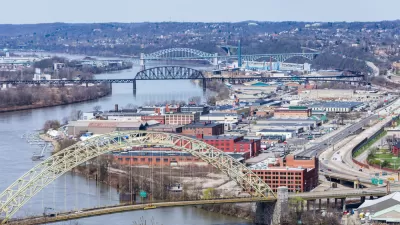The city of Toledo, Ohio provides a case study in how the best intentions of attracting degree-holding Millennials can come up short.

"Toledo continues to show signs of becoming more cool, hip, and attractive to college-educated young people," report Tom Henry and Gabby Deutch,"[b]ut statistics show the rebranding effort isn’t generating results as quickly as people want."
The article shares the results of a study of U.S. Census data commissioned by the Pew Charitable Trusts, finding that "Toledo ranked only 455th out of 521 U.S. cities for percentage growth of degree-holding Millennials between 2000 and 2014."
The article also compares the data on Millennials in Toledo to the data from other cities likes Baltimore, St. Louis, and Pittsburgh, which have all had more success in the effort. The article describes the data from Toledo as an example of the limitations of the "Rust Belt chic" model of redeveloping old buildings "with character," but "nearly 10 years after the Toledo Regional Chamber of Commerce launched a campaign to halt the so-called 'brain drain' Toledo and other Rust Belt cities were experiencing, the city is finding that retaining and attracting more college-educated Millennials require more than just a good coffeehouse," write Henry and Deutch.
The article calls on national experts, like William Frey from the Brookings Institution’s Metropolitan Policy Program, and local academics to paint a detailed portrait of the many community and economic development underway in recent years in Toledo.
FULL STORY: Toledo struggles to attract, keep young professionals

Trump Administration Could Effectively End Housing Voucher Program
Federal officials are eyeing major cuts to the Section 8 program that helps millions of low-income households pay rent.

Planetizen Federal Action Tracker
A weekly monitor of how Trump’s orders and actions are impacting planners and planning in America.

Ken Jennings Launches Transit Web Series
The Jeopardy champ wants you to ride public transit.

Driving Equity and Clean Air: California Invests in Greener School Transportation
California has awarded $500 million to fund 1,000 zero-emission school buses and chargers for educational agencies as part of its effort to reduce pollution, improve student health, and accelerate the transition to clean transportation.

Congress Moves to End Reconnecting Communities and Related Grants
The House Transportation and Infrastructure Committee moved to rescind funding for the Neighborhood Equity and Access program, which funds highway removals, freeway caps, transit projects, pedestrian infrastructure, and more.

From Throughway to Public Space: Taking Back the American Street
How the Covid-19 pandemic taught us new ways to reclaim city streets from cars.
Urban Design for Planners 1: Software Tools
This six-course series explores essential urban design concepts using open source software and equips planners with the tools they need to participate fully in the urban design process.
Planning for Universal Design
Learn the tools for implementing Universal Design in planning regulations.
Heyer Gruel & Associates PA
Ada County Highway District
Institute for Housing and Urban Development Studies (IHS)
City of Grandview
Harvard GSD Executive Education
Toledo-Lucas County Plan Commissions
Salt Lake City
NYU Wagner Graduate School of Public Service





























